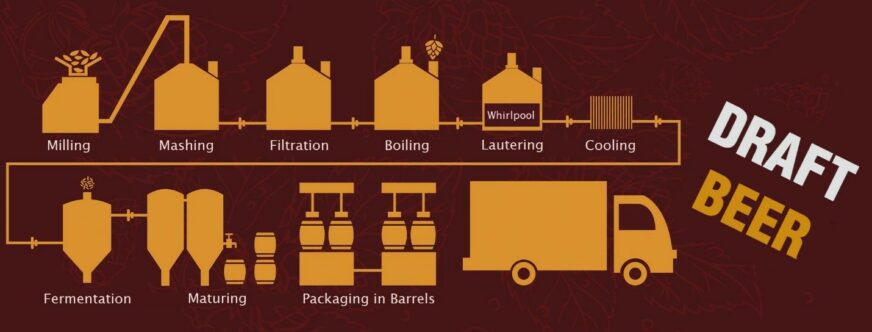Read in Georgian.
From prehistoric times, beer has been produced and consumed by people all around the globe. Although its exact origin is not yet confirmed, there is evidence to believe that beer was produced as early as 7,000 BC, with some of the earliest records of its production showing that beer was not a mere agricultural product in ancient Sumer, but also proof of the development of centralized economies in ancient civilizations.[1] Numerous archaeological and historical findings have also been identified in Egypt (where it was considered a staple of daily life), or in the Caucasus (where brewing practices were developed since the early Bronze Age). In the Middle Ages, beer was brewed by monks in monasteries throughout Europe. These monks refined the brewing process and developed new techniques for creating different styles of beer. Today, beer is one of the most popular alcoholic beverages in the world, with a wide range of flavours being available across countries and regions.
Beer brewing involves fermenting grains such as barley, wheat, or corn with yeast. This process converts the natural sugars of the malted grains into alcohol and carbon dioxide, resulting in the characteristic flavour and carbonation of the beer. Most recipes use barley, bread, and water, mix them together, and leave the mash to ferment. The responsible consumption of beer is associated with leisure, rest, or celebration, and in 2020, the global consumption of beer amounted to 177.5 million kilolitres (equivalent to 280.4 billion of 633 ml bottles)[2], and a revenue of around 533 billion USD.[3]
In Georgia, the expected annual revenue from the beer segment in 2023 is foreseen at around 199.5 million USD. The market is expected to grow annually by 5.60%[4], with a consumption per capita of 31.2 litres[5]. Because of this, local or craft beer entrepreneurs are witnessing new benefits and challenges in their effort to maximize production, meet the increased demand, and benefit from the growing international competitiveness.
The typical cycle of beer brewing begins with the preparation of the initial ingredients (mostly starch of grains such as malted barley, wheat, or corn) and water. First, the barley malt undergoes “malt milling”, which results in milled malt that is afterwards mixed with water under high temperatures to dissolve the sugars, and then it is filtered. The filtered wort is moved to boiling, a process during which the excess water is removed, and hops are added to give flavour and stabilize the beer. The boiled mass is then filtered and moved to a separate tank where the process of fermentation begins. Here, yeast is added and the mix is kept at a constant temperature via cooling (as fermentation is a heat-generating process), which incurs additional expenses related to energy and the availability of the necessary technology. After fermentation, the young beer is moved into specialized tanks for maturation and is afterwards filtered to remove any remaining particles. Depending on the recipe, the entire process can last up to several weeks.

Figure 1. Brief Overview of the Brewing Process.

In Eastern Georgia, Apeni Brewery is regarded as a top beer producer. Located in the village of Tsabukiuani, Lagodekhi Municipality, the company plays an important part in the local economy, employing workers for both the brewery itself and its adjacent restaurant, while utilizing produce from local suppliers and farms.
The need to optimize production, as well as the desire to reduce energy and water consumption, have all motivated Apeni Brewery to join the UNIDO Resource Efficient and Clean Production (RECP) Demonstration Project under EU4Environment. In its efforts to invest in a more resource and energy-efficient production, the company has also been independently installing seven solar water heaters and a solar PV power plant with a capacity of 130 kW. Between 2021-2022, during the RECP assessments, the experts evaluated the key areas of the brewery and bottling process, determining measures to decrease energy and resource consumption, all while promoting sustainable practices. Here, one of the RECP proposals has been to recirculate the condensate. This way, the consumption of water in the facility can be reduced, alongside the requirement to soften the boiler feedwater. To implement this measure, the company would require an investment of 1,460 GEL (approximately 500 EUR), which would result in annual financial savings of 8,655 GEL (3,000 EUR) and energy savings of up to 66 MWh per year. Additionally, the company would decrease its annual CO2 emissions by 12.3 tonnes.
The company’s motivation and commitment to a more sustainable production model would also lead Apeni Brewery to become a successful example for other SMEs in this sector, in Georgia, as well as in the EU’s Eastern Partnership (EaP) region, overall.
Back to ‘Greening the Industry’ in Georgia
Back to the ‘Greening the Industry Campaign’ in the Eastern Partnership.
[1] https://www.tf.uni-kiel.de/matwis/amat/iss/kap_2/articles/old_beer.pdf
[2] https://www.kirinholdings.com/en/newsroom/release/2022/0127_04.html
[3] https://www.statista.com/outlook/cmo/alcoholic-drinks/beer/worldwide#revenue
[4] https://www.statista.com/outlook/cmo/alcoholic-drinks/beer/georgia
[5] https://bm.ge/en/article/georgians-consume-almost-five-times-less-beer-than-czechs/114440





